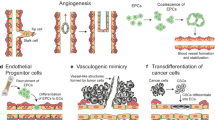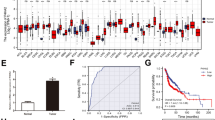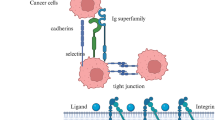Abstract
Although antivascular endothelial growth factor a (VEGFa) treatment has been well applied in cervical cancer therapy, the underlying molecular basis has not been precisely identified. Here, we examined the levels of VEGFa on the tumor growth and invasion in four commonly used human cervical cancer cell lines. We found that overexpression of VEGFa in these lines increased the tumor growth and invasiveness, while inhibition of VEGFa decreased the tumor growth and invasiveness. To figure out the involved signaling pathways, we applied specific inhibitors for ERK/MAPK, JNK, and PI3K/Akt signaling pathways, respectively, to VEGFa-overexpressing cervical cancer lines and found that only inhibition of PI3K/Akt signal transduction abolished VEGFa-induced increases in cell growth and invasiveness. Inhibition of Akt downstream mTor signaling similarly inhibited cell growth and invasion in VEGFa-overexpressing cervical cancer cells, suggesting that VEGFa may activate PI3K/Akt, and subsequently its downstream mTor signaling pathway, to promote cervical cancer cell growth and invasion. Furthermore, the effects of VEGFa-induced activation of mTor signaling cascades appeared to promote cancer cell growth through cyclinD1 and CDK4 activation and promote cancer cell invasion through MMP2 and MMP3. Taken together, our data suggest that anti-VEGFa treatment in cervical cancer may inhibit both tumor cell growth and invasion through PI3k/Akt/mTor signaling pathway.




Similar content being viewed by others
References
Delli Carpini J, Karam AK, Montgomery L. Vascular endothelial growth factor and its relationship to the prognosis and treatment of breast, ovarian, and cervical cancer. Angiogenesis. 2010;13:43–58.
del Campo JM, Prat A, Gil-Moreno A, Perez J, Parera M. Update on novel therapeutic agents for cervical cancer. Gynecol Oncol. 2008;110:S72–6.
Zagouri F, Sergentanis TN, Chrysikos D, Filipits M, Bartsch R. Molecularly targeted therapies in cervical cancer. A systematic review. Gynecol Oncol. 2012;126:291–303.
Kim JG. Molecular targeted therapy for advanced gastric cancer. Korean J Intern Med. 2013;28:149–55.
Ilson DH. Angiogenesis in gastric cancer: hitting the target? Lancet. 2014;383:4–6.
Scartozzi M, Giampieri R, Loretelli C, Bittoni A, Mandolesi A, Faloppi L, et al. Tumor angiogenesis genotyping and efficacy of first-line chemotherapy in metastatic gastric cancer patients. Pharmacogenomics. 2013;14:1991–8.
Xiao X, Prasadan K, Guo P, El-Gohary Y, Fischbach S, Wiersch J, et al. Pancreatic duct cells as a source of VEGF in mice. Diabetologia. 2014;57:991–1000.
Bagri A, Kouros-Mehr H, Leong KG, Plowman GD. Use of anti-vegf adjuvant therapy in cancer: challenges and rationale. Trends Mol Med. 2010;16:122–32.
Xiao X, Guo P, Chen Z, El-Gohary Y, Wiersch J, Gaffar I, et al. Hypoglycemia reduces vascular endothelial growth factor a production by pancreatic beta cells as a regulator of beta cell mass. J Biol Chem. 2013;288:8636–46.
Ferrara N. Vascular endothelial growth factor. Arterioscler Thromb Vasc Biol. 2009;29:789–91.
Carmeliet P, Jain RK. Molecular mechanisms and clinical applications of angiogenesis. Nature. 2011;473:298–307.
Davidson B, Reich R, Risberg B, Nesland JM. The biological role and regulation of matrix metalloproteinases (mmp) in cancer. Arkh Patol. 2002;64:47–53.
Rhee JS, Coussens LM. Recking mmp function: Implications for cancer development. Trends Cell Biol. 2002;12:209–11.
Mitra A, Chakrabarti J, Chattopadhyay N, Chatterjee A. Membrane-associated mmp-2 in human cervical cancer. J Environ Pathol Toxicol Oncol Off Organ Int Soc Environ Toxicol Cancer. 2003;22:93–100.
Thompson EW, Yu M, Bueno J, Jin L, Maiti SN, Palao-Marco FL, et al. Collagen induced mmp-2 activation in human breast cancer. Breast Cancer Res Treat. 1994;31:357–70.
Harashima H, Dissmeyer N, Schnittger A. Cell cycle control across the eukaryotic kingdom. Trends Cell Biol. 2013;23:345–56.
Diaz-Moralli S, Tarrado-Castellarnau M, Miranda A, Cascante M. Targeting cell cycle regulation in cancer therapy. Pharmacol Ther. 2013;138:255–71.
Bertoli C, Skotheim JM, de Bruin RA. Control of cell cycle transcription during g1 and s phases. Nat Rev Mol Cell Biol. 2013;14:518–28.
Lim S, Kaldis P. Cdks, cyclins and ckis: roles beyond cell cycle regulation. Development. 2013;140:3079–93.
Xiao X, Gaffar I, Guo P, Wiersch J, Fischbach S, Peirish L, et al. M2 macrophages promote beta-cell proliferation by up-regulation of smad7. Proc Natl Acad Sci U S A. 2014;111:E1211–20.
Wang YQ, Guo X, Qiu MH, Feng XY, Sun FY. Vegf overexpression enhances striatal neurogenesis in brain of adult rat after a transient middle cerebral artery occlusion. J Neurosci Res. 2007;85:73–82.
Biggs 3rd WH, Meisenhelder J, Hunter T, Cavenee WK, Arden KC. Protein kinase b/akt-mediated phosphorylation promotes nuclear exclusion of the winged helix transcription factor fkhr1. Proc Natl Acad Sci U S A. 1999;96:7421–6.
Conflicts of interest
None
Author information
Authors and Affiliations
Corresponding author
Additional information
Baohuan Chen and Chunxiao Zhang equally contributed to this paper.
Rights and permissions
About this article
Cite this article
Chen, B., Zhang, C., Dong, P. et al. Molecular regulation of cervical cancer growth and invasion by VEGFa. Tumor Biol. 35, 11587–11593 (2014). https://doi.org/10.1007/s13277-014-2463-2
Received:
Accepted:
Published:
Issue Date:
DOI: https://doi.org/10.1007/s13277-014-2463-2




